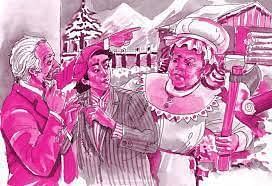Introduction - The Beggar | English Literature for Grade 9 PDF Download
INTRODUCTION
This is the story of Lushkoff, a beggar. He earns a little by telling lies and thus evoking sympathy in his listeners. One day he comes across Sergei, who does not give him alms but offers to give him work. Lushkoff is weak and unwilling to do the laborious job of chopping wood. But the job is somehow done. He gives up begging. Years later when Sergei comes across Lushkoff, he is no longer a beggar but a respectable notary. Then he discloses the fact that it was Sergei’s maidservant who had chopped the wood for him. This act of her kindness had influenced him so much that his whole life was changed.

Introduction (2)
Some people get into bad habits and find it difficult to quit on their own. Compassion, concern and care from fellow humans go a long way in reforming such people. There is always hope for a renewed and better life if one gets kindness from others.
THEME
The story is based on the theme of transformation of a depraved alcoholic through kindness, compassion and selflessness. Olga’s words and noble deeds changed Lushkoff’s heart. He gave up drinking and mended his truant ways. Another theme that runs through the story is gratitude. Lushkoff had become weak because of alcoholism and was no longer able to work. He resorted to telling lies and begging in order to survive. But when he received kindness, he acknowledged it with gratitude and remained indebted to Olga for life.
Theme (2)
Very often we find that lazy person who is not ready to work take to begging so as to make an easy life. But this should not be condoned. Every person should try to earn his livelihood. Every person should work to earn his bread. Here we find Sergei giving an opportunity to Lushkoff to work. Lushkoff, because of Olga’s help and concern for him, makes use of it and quits begging and starts leading a decent life.
TITLE
The story is about the reformation of a beggar, Lushkoff who is helped by two different people in two different ways. The beggar is poor because he does not have any money and also because he does not have any integrity of character. He requires alms to feed himself.and also genuine help to feed his impoverished soul. A prosperous advocate, Sergei, and his noble cook, Olga, help the beggar, Lushkoff, to come out of his miserable life and live respectably. The title “The Beggar” is apt in that it highlights the plight of a beggar to the readers and make them understand that beggars are unfortunate people who need more than money.
Justification of the Title
Lushkoff is a beggar who is harmless and spends his life on the streets. His habit is to tell lies and beg from the people. He asks for alms from Sergei, an advocate, who admonishes him but also helps him out. Since the story revolves around the beggar Lushkoff, the title is justified.
Vocabulary
- Renting: Leasing a residence
- Pledge: Solemn promise
- Plot: Scheme
- Slander: Malicious falsehood
- Sufferer: Individual in distress
- Legal representative: Attorney
- Petitioner: Person making a formal request
- Proposal: Suggestion
- Beggar: Mendicant
- Indebted: Owing gratitude
- Situation: Set of circumstances
- Eject: Dismiss forcefully
- Murmur: Speak softly
- Angered: Flushed with rage
- Abhor: Strongly dislike
- Deceive: Trick
- Pampered: Indulged
- Declare: Publicly announce
- Spade: Tool for excavating
- Drag: Pull forcibly
- Serious: Grave
- Melancholy: Morose
- Self-conscious: Feeling uneasy
- Inactivity: Lack of action
- Feebleness: Lack of strength
- Dissent: Objection
- Imitate: Mimic
- Courtyard: Open space within a property
- Wavy: Hair characterized by curls
- Timidly: With apprehension
- Identify: Discern
- Criticism: Adverse evaluation
- Safeguard: Protective shield
- Appreciative: Grateful
- Indebted: Beholden
- Specifically: Precisely
WORD-MEANINGS
- Induced: Inspired - प्रेरित किया - Motivated or persuaded to do something.
- Copecks: Russian currency - रूसी मुद्रा - The subunit of the Russian currency.
- Lodging: Temporary residence - रहने का स्थान - A place to stay temporarily.
- Swear: Take oath - कसम खाना - Make a solemn declaration or promise.
- Intrigues: Tricks - चालें - Secret schemes or plots, typically to achieve an illicit purpose.
- Calumny: Defamatory statement - निंदाजनक कथन - A false and malicious statement designed to damage someone's reputation.
- Ragged: Torn - फटा हुआ - Old and torn, in poor condition.
- Fawn: Young deer - हिरण का बच्चा - A young deer.
- Suppliant: Applicant - आवेदक - A person making a humble plea to someone in power or authority.
- Mendicant: Beggar - भिखारी - A person who begs for a living.
- Expelled: Thrown out - निकाल देना - Officially made to leave a place, especially a school or organization.
- Mumbled: Grumbled - बुडबुड़ाया - Speak in a low, indistinct manner, almost to oneself.
- Taken aback: Amazed - हैरान - Surprise or shock someone momentarily.
- Flushed: Turned red - लाल हो जाना - Become red and hot, typically as a result of illness or strong emotion.
|
98 videos|532 docs|74 tests
|
FAQs on Introduction - The Beggar - English Literature for Grade 9
| 1. What is the beggar class in society? |  |
| 2. What are some common reasons that lead people to become part of the beggar class? |  |
| 3. How does society typically view the beggar class? |  |
| 4. What are some ways to help the beggar class in society? |  |
| 5. How can we address the root causes of the beggar class in society? |  |



























